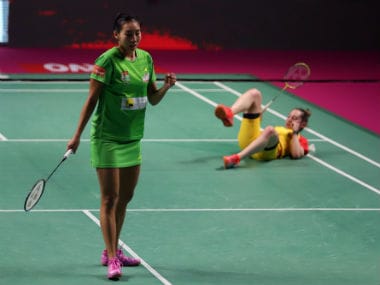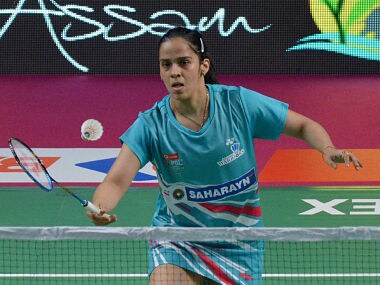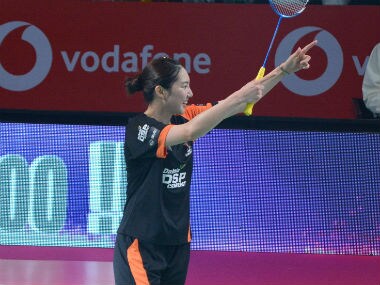Life as a self-funded athlete is an onerous one, especially if you are representing a non-Asian country in a sport like badminton. From scouring the cheapest air tickets to training alone, the lifestyle here is a series of endless problems.
This is a tale about two lone rangers from countries where there is no culture of badminton. Countries where badminton is looked upon as an amateur sport. Despite the struggle, Canada’s Michelle Li and Beiwen Zhang of the US, both players of Asian descent, are ready to challenge the Asian powerhouses to set an example for North America as well as Europe.
“I no longer want badminton to be known as a sport for the Asians,” said Li, who plays for the North Eastern Warriors in the Premier Badminton League (PBL).
There is hardly any competition from Europe or America. Countries like Denmark and Spain have still managed to rankle the Asians at times, but they are yet to cause a major disruption. However, it was a rare moment in world badminton when Denmark’s Camilla Martin smashed a hole in the Chinese wall in 1999 by snatching the World Championship crown from Dai Yun in thrilling fashion. The sold-out arena was stunned, as her ex-boyfriend Peter Gade celebrated the win with the Danish fans.
Since then, only Carolina Marin of Spain has been able to cause problems for the Asians as she became the first non-Asian shuttler in 2014 to be crowned world champion in Copenhagen. “If Spain can do it, so can Canada and other upcoming countries. It’s an inspiration for shuttlers like me because I am not from Asia but from a very small badminton community,” says an optimistic Li, who is currently ranked 21st in the latest BWF rankings.
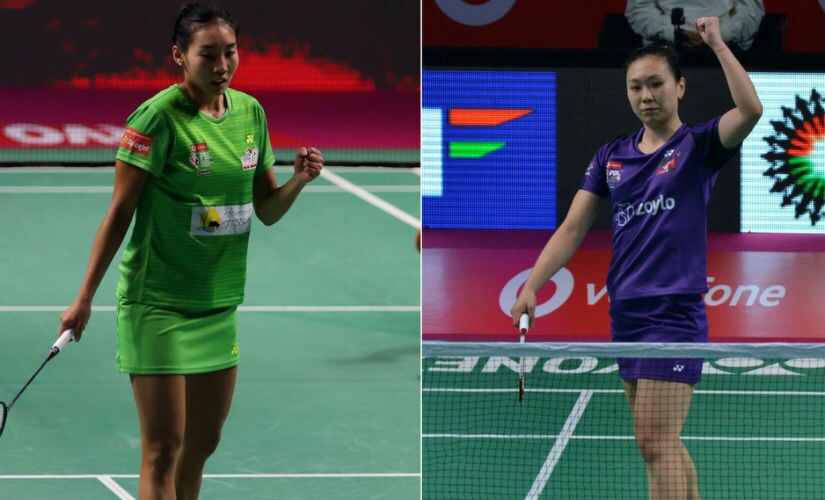
North Eastern Warriors' Michelle Li and Mumbai Rockets' Beiwen Zhang.
The depth in the Asian squad is something other countries are envious of. Other countries find it too demanding to match up to the standards set by the Asians; hence some players have to take a tough route to reach the top level. "Badminton in Canada is definitely not as big as it is in India. Everything is self-funded. We have to go to tournaments on our own. We have a national team but we don’t play together,” said Li before adding: "When you play badminton for Canada, many people look down on you and say that 'you can’t be in top 20, you can just be in top 100 or 50’ and that's one of the big problems.
The Hong Kong-born shuttler moved to Canada with her parents in 1997. She and her mom often played badminton on a sunny day at a park nearby. As badminton became a habit, her mother took her to Lee’s Badminton Centre, a local club in Markham, where she would spend a dozen years under Jennifer Lee. “We have our own personal coaches. We do have national coaches but we don’t train with them apart from team events. Usually, we train on our own,” added the Canadian added.
Just like Li, Zhang trains alone and more often than not without a coach even while preparing for international competitions. In fact, Zhang has to often choose to stay at budget hotels or reach out to friends or relatives for accommodation. "I don't have a coach or a manager but that's how it is. I've been used to this," says Zhang, who was picked by Mumbai Rockets this season.
The Liaoning-born shuttler moved to Singapore when she was 13 under the Foreign Talent Scheme and soon earned citizenship. Many foreign players have moved from various countries as BWF states that a shuttler doesn't have to be citizens of the country they represent to compete in international tournaments.
In 2008, she famously parted ways with the Singapore national team and joined clubs in Malaysia and Taiwan, before eventually returning to the global financial centre for the 2009 Southeast Asian Games. But things didn’t go as planned for Zhang as she was dropped by the Singapore Badminton Association (SBA) after falling out with Thai coach Luan Ching. Running out of options, a switch to Las Vegas seemed ideal for her as she would go on to claim four International Challenge tournaments in 2013, before winning the US, Brazil, and Dutch Grand Prix titles.
Despite not having a coach since five years, she is proud of the path she has chosen. “Freedom,” Zhang exclaims when asked about her decision to move from Singapore to the US. “I play for fun and badminton gives me happiness. Playing for the US gives me a lot of hope to continue. But at Singapore, things were controlled and now US allows me to choose whatever I want,” the World No 12 adds.
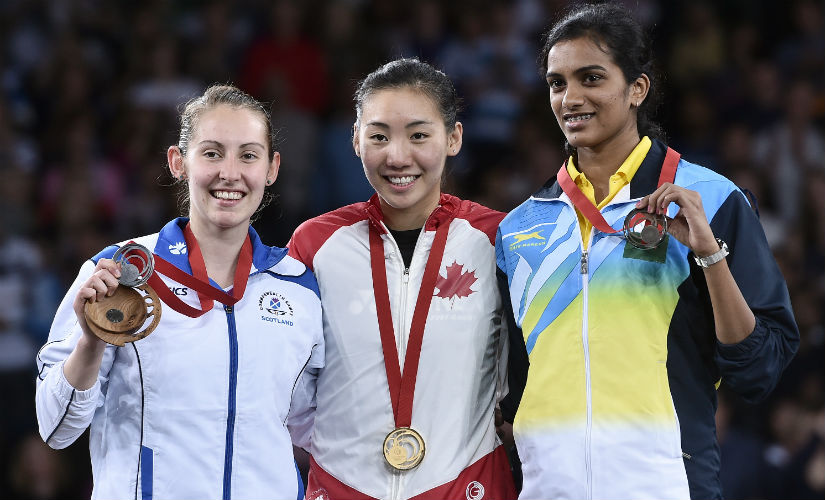
Gold medallist Michelle Li poses with Kirsty Gilmour (L) and PV Sindhu (R). AFP
Back in Canada, Li is a six-time national champion, a three-time Pan Am Games gold medallist. Notably, she also claimed the 2014 Commonwealth gold ahead of silver medallist Kirsty Gilmour and bronze medallist PV Sindhu. We haven't finished yet. Li was paired with Alexandra Bruce — nicknamed ‘Bruce-Li’ pair — in the women’s doubles discipline and gained the much-needed recognition on the international stage by finishing fourth at the 2012 London Olympics. Despite the hardships, she doesn't regret her decision of not considering to play under a much better environment in Hong Kong or possibly China.
“Everything would fall in place if I’d played for Hong Kong. They have all the resources and yes it could’ve been a lot better. But for me, I want to represent Canada, where I grew up, and grow the sport in the country. I know things are difficult but playing for Canada will help the sport and that’s my target. “
Similarly, Zhang would have been in a better place had she represented China, where she was born. However, she believes that the Chinese already have so many players in every department. “It’s really hard to go back to China. They don’t really need players as the system is well-maintained. Once the results start coming, the USA will start its process,” reasons Zhang.
Insufficient funds, but we march on
Government funding is not enough, as they still have to empty their pockets to travel abroad and compete. It’s not an option but the only way out for them. “The government has a funding program but it is just not enough. We still have to figure out and pay ourselves to compete,” says Li.
When the association cannot, it’s the people of Canada who have become a support system and Li doesn’t want to let them down. “People have started supporting me here, so I want to become an example for the aspiring shuttlers in Canada.
Meanwhile, the only luxury for Zhang is her sponsorship with Yonex. The US government hardly provides funds or arrangements for its players to show up at tournaments. She often skips certain tournaments just so that she can save some money for bigger events. “Travelling to tournaments is very difficult. Whatever I earn is spent on the preparation of the tournaments within a blink of an eye,” says Zhang.
Although she competed at 17 tournaments last year, her only success in 2017 came at the Dutch Open in October. What’s interesting is that her opponent in the final was Li, who lost to Zhang in straight games.
The Singaporean believes that the support from the Canadian association is far better than in the US and Li cannot deny that.
"Yes. We meet quite often at tournaments. The situation is quite similar now after she moved from Singapore to the US. The association here is doing a lot to speed up the process and introducing a lot of new things. They are also seeing a lot of potential in the juniors. In the next 10 years, there’s going to be some growth.”
Lastly, leaving better facilities, coaches and rankings is not exactly a loss for the duo. For them, it's setting an example for talented players who fall short of making big due to lack of resources. "The US is a huge country and I want badminton to be popular here like it is in Asia," says Zhang whose next aim is to represent the US at the 2020 Olympics in Tokyo.
"I know it’s a tough road that I’ve chosen. You do consider whether it’s worth or not. But if I stop midway and I never go the full distance, I would regret it in future," Li concludes.
Published Date: Jan 11, 2018 15:44 PM | Updated Date: Jan 11, 2018 15:44 PM

